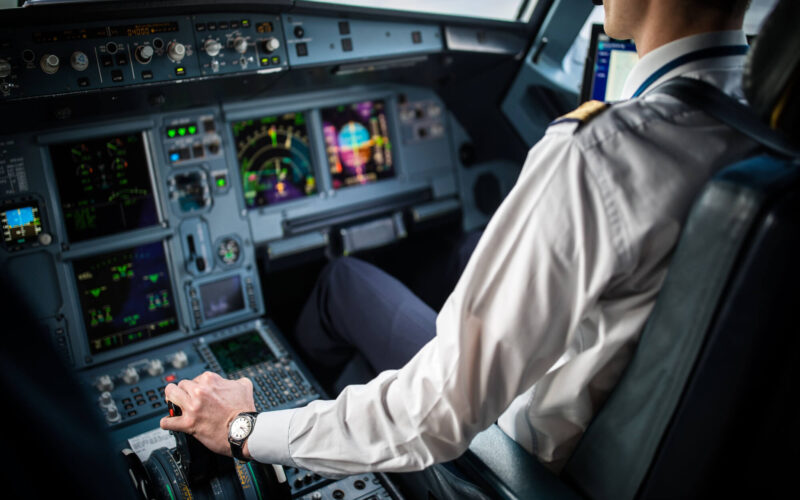The UK Civil Aviation Authority has announced “landmark” changes to the way pilots living with HIV will be medically assessed, reflecting modern treatment and allowing them to continue their flying dreams. AeroTime spoke exclusively to campaigner and pilot James Bushe about the changes.
The updated regulations, supported by the Terrence Higgins Trust, the National AIDS Trust and the British HIV Association, will make it easier for pilots living with HIV to obtain Class 1 medical certification in the UK. A Class 1 medical is required for all commercial pilots.
Under the new guidance, announced on June 20, 2022, the regulator confirms that with a timely diagnosis of HIV and antiretroviral therapy, “there is a much lower risk of a pilot suffering conditions that could impair their ability to safely fly aircraft.”
The CAA also announced an amnesty for any pilot or air traffic controller who has not previously declared their HIV positive status to come forward in confidence without the need to notify their employer.
“The UK will continue to lead the way in supporting pilots living with HIV to fly safely and pursue their careers and dreams,” Richard Moriarty, CEO of the UK CAA, commented in a press statement. “Recent medical advances mean that if someone with HIV effectively manages their condition, they should be able to live a near-normal life.”
The changes were ultimately kickstarted by the campaigning of James Bushe, who was diagnosed with HIV in 2014. In 2017, Bushe was accepted onto a pilot training course, but was unable to obtain the necessary Class 1 medical because of his HIV positive status. However, at that time, pilots who had already qualified and then contracted HIV were still allowed to fly. Bushe started a campaign to change the rules, gathering medical evidence and reaching out to politicians. In 2018, the CAA altered the rules and Bushe achieved his dream, becoming a pilot with Loganair in January 2020.
Bushe, who flies the Embraer E145 for Loganair, told AeroTime that after five years of campaigning, he was “incredibly proud” of the work done by the CAA and hoped it would make a difference not just in the UK, but to pilots and controllers across the world.
“It’s a landmark because the CAA has gone further than any other regulator in the world regarding HIV,” the 34-year-old said. “What we now have is a framework that makes it easier to obtain and retain a medical.”
“HIV has changed,” Bushe said. “And there is absolutely no reason why anybody living with HIV, pilots, air traffic controllers or otherwise, should be prevented on medical grounds from doing anything that they want to be.”
“We have a framework now that any other regulator in the world can pick up on,” Bushe said. Ultimately, if somebody’s living with HIV who is on treatment in any other country in the world, they too should be able to get their medical.”
Open and honest
As part of the new guidance, the UK CAA announced a 6-month period, starting from June 20, for those living with HIV who had not previously declared their status to come forward without facing enforcement action. Their health status will be reviewed and their records updated, without their employer being notified, the CAA said.
“I want to appeal personally to anyone who has previously not declared their HIV status to contact us within the next six months so we can reset this with you in total confidence,” the CAA’s Moriarty said.
Bushe said the six-month grace period was a crucial part of the new guidance. “I hope it will alleviate all of the fear that I know exists with pilots that are living with HIV that haven’t declared their status, the pilots that go to their medical every year and wonder if this will be the year that it’s discovered. Now, they can be completely open and honest and get the right support.”
Following diagnosis of HIV infection, a pilot’s medical certificate is temporarily suspended while they establish treatment and an aeromedical assessment takes place. The CAA’s new guidance sets out what steps and testing a pilot needs to undertake to enable them to return to the skies, including confirmation that the condition is well controlled with regular follow up and monitoring in place.
Diversity & Inclusion
Richard Stephenson, Chairman of AeroTime Group and former UK CAA Director, said he was pleased to see the development and commended the work of Dr Ewan Hutchison, head of medical assessment at the Civil Aviation Authority, noting he has worked hard to bring about these changes.
“The UK CAA has taken a proactive approach to this issue and to promoting diversity and inclusion in general. Having created the first D&I board at the organization I am pleased to see this work continuing in this way, especially during Pride month.”
AeroTime is marking Pride month with its ‘inclusive aviation’ banner and Stephenson said everyone at the company was delighted to see progress like this being made. “There is still a long way to go to achieve the levels of equality we are working towards, but we will continue to support the industry through initiatives like our ‘Women in Aviation’ campaign and in any other way we can.”

